A specter is haunting Europe – the specter of word processing!
Evelyn Fürlinger, Roland Gratzer and Johannes Grenzfurthner finished script version 4.0! A milestone!
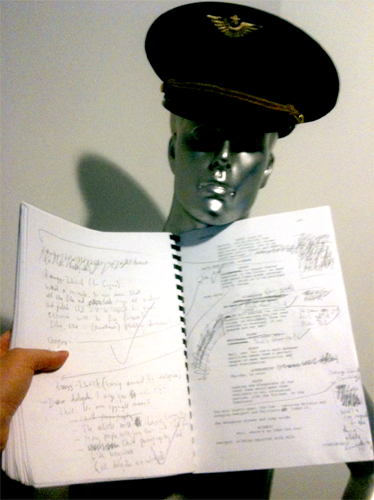
A specter is haunting Europe – the specter of word processing!
Evelyn Fürlinger, Roland Gratzer and Johannes Grenzfurthner finished script version 4.0! A milestone!

The village Unterzoegersdorf really exists, near Stockerau, and we are planning to shoot some scenes there, but it’s pretty much impossible to build our UN camp near the tiny hamlet. We have to find the perfect spot, and that’s why our location scout — Sarah Strauss — is currently travelling through Lower Austria.

Let’s redefine “the middle of nowhere!”
We are currently preparing for a major shoot in January 2012.
No, it’s not a shoot for Sierra Zulu. And yet, it is. We want to create a short film prequel of Sierra Zulu, to spread the word, tell the prestory, and to have material for possible partners.
The film will be called “Earthmoving.”
The Story?
Another day at the United Nations offices in Vienna. The Austrian Foreign Affairs Ministry invited members of the European Protocol Service, the UN Strategic Command Center for Central Europe, the United States Air Forces and a regional politician from Lower Austria to talk about the future of Soviet Unterzoegersdorf. The tiny microstate, an enclave created after WWII, is surrounded by Lower Austrian farmland.
It escaped the ravages of time and is the last proud member of the grand Soviet Union. The border between Soviet Unterzoegersdorf and Europe is disputed, or — let’s phrase it more correctly — so unimportant, that no diplomats are willing to deal with it. But a citizens’ initiative started by land-owning farmers in the border region demands formal status for the Soviets. No official recognition is bad for business, especially lucrative subsidies…
We have a great cast (Jeff Ricketts, Lynsey Thurgar, Alexander Fennon, Adrienne Ferguson and Martin Auer) and a wonderful production team…
…and today we started to take still images of heavy equipment for composting work!
It was great that Johnny Dibon (who is working for Zeppelin-Cat Austria) made it possible to do the photo shooting — from the roof of their building.

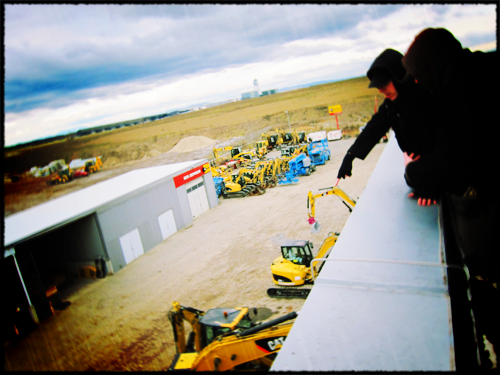 (More images on Sierra Zulu’s Flickr page)
(More images on Sierra Zulu’s Flickr page)
Johannes Grenzfurthner and Roland Gratzer at Sources 2 scriptwriting workshop (Cape East in Haparanda, Sweden).
Time to get Sierra Zulu V4.0 done!
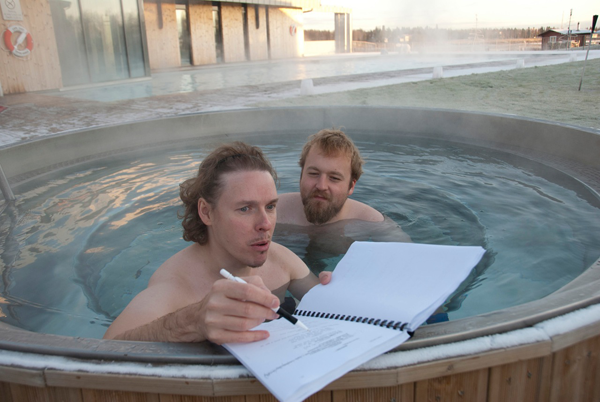 (Image by Mikael Rutqvist, Filmpool Nord)
(Image by Mikael Rutqvist, Filmpool Nord)
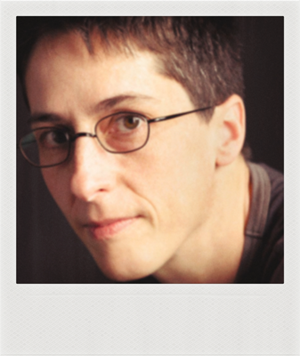 “Dykes to Watch Out For” was a comic strip by Alison Bechdel. This comic strip popularized an uncomplicated test for films to determine gender bias. The Bechdel test appears in a 1985 strip entitled “The Rule”. One of the characters says that she only watches a movie if it satisfies the following requirements:
“Dykes to Watch Out For” was a comic strip by Alison Bechdel. This comic strip popularized an uncomplicated test for films to determine gender bias. The Bechdel test appears in a 1985 strip entitled “The Rule”. One of the characters says that she only watches a movie if it satisfies the following requirements:
It has to have at least two women in it,
Who talk to each other,
About something other than a man.
We just reviewed our current script version. Sierra Zulu only has six female characters, but it will still pass the Bechdel test.
So, fellow filmmakers, if we can do it, you can do it too!
 SOURCES 2 is a series of high-powered work units for scriptwriters and teams of writers and co-writers, directors or producers with a specific film project in development.
SOURCES 2 is a series of high-powered work units for scriptwriters and teams of writers and co-writers, directors or producers with a specific film project in development.
Sierra Zulu’s Roland Gratzer and Johannes Grenzfurthner will take part in the upcoming workshop in Haparanda (Northern Sweden). There is not a lot of daylight, but tons of time to discuss and refine some exciting scripts.
And there is a sauna.
Director Johannes Grenzfurthner gave a short presentation about traditional narrative cinema, the problems of storytelling and Sierra Zulu.
(Update: the talk was featured on Boing Boing, Laughing Squid and Pijamasurf)
Part of Sierra Zulu’s storyline is an animated sequence. Johannes Grenzfurthner has been talking to a number of animation studios, but he’s proud being able to announce a collaboration with the glorious comrades at ShotShotShot.
 ShotShotShot is a motion design boutique that opened its doors in Graz in 2006. Their concepts and work are based on experiences and influences from rock music, architecture, computer graphics and film.
ShotShotShot is a motion design boutique that opened its doors in Graz in 2006. Their concepts and work are based on experiences and influences from rock music, architecture, computer graphics and film.
In the beginning they did a lot of music videos, exploring visual ideas and narrative concepts. Soon they attracted commercial clients. Today the team gives the same effort for local bands and brands as they do for big names such as T-Mobile, Austrian Airlines, A-TV, Microsoft, PKP-BBDO, Young&Rubicam and Jung von Matt.
ShotShotShot is a full service agency that offers clients any thinkable format of digitally produced moving images, from concept to delivery, without letting go of their “do it yourself but without compromise” attitude. Soviet Unterzoegersdorf is thankful.
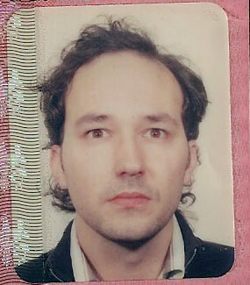
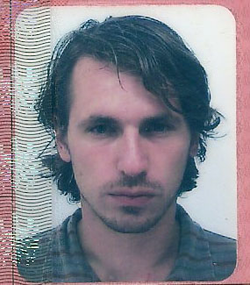
(Above: Daniel Bauer and Richard Techt, ShotShotShot)
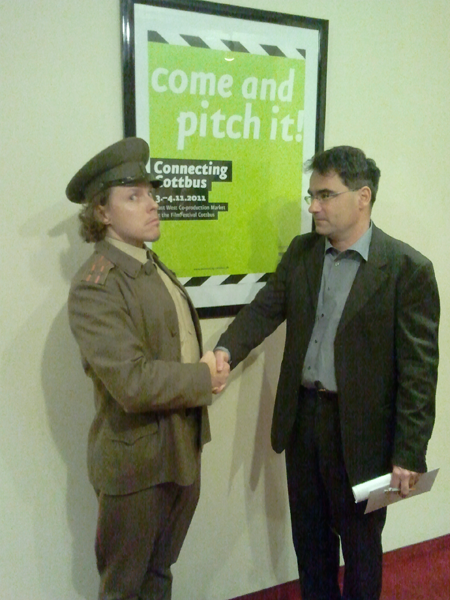 His Excellency Commissar Nikita Perostek Chrusov of Soviet Unterzoegersdorf is being greeted by Bernd Buder, director of Connecting Cottbus.
His Excellency Commissar Nikita Perostek Chrusov of Soviet Unterzoegersdorf is being greeted by Bernd Buder, director of Connecting Cottbus.
Take this, pitches!
 His Excellency Commissar Nikita Perostek Chrusov of Soviet Unterzoegersdorf will be giving a motivational speech and hands-on demonstration at Connecting Cottbus in Cottbus (Eastern Germany). He will be joined by Sierra Zulu’s producer Sabine Gruber.
His Excellency Commissar Nikita Perostek Chrusov of Soviet Unterzoegersdorf will be giving a motivational speech and hands-on demonstration at Connecting Cottbus in Cottbus (Eastern Germany). He will be joined by Sierra Zulu’s producer Sabine Gruber.
The aim of this military exercise is to improve international cooperation and financial stability.
Connecting Cottbus is an East-West co-production market which paves the way for ideas to be realized. Producers could submit new feature film projects together with their screenwriter or director. An expert jury selects the projects which are presented to the professional audience of experienced producers, buyers and financiers – often for the first time outside of the home country.
The audience reaction soon makes it clear whether the project will have a chance of finding its audience in the various countries. Topical insights into the production landscape of East and Central European countries are offered in discussions and case studies. Over time, not only exiting co-productions but also a lively network have been created between Eastern and Western Europe.
November 1-4, 2011.
Link
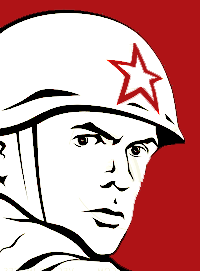 Our director Johannes Grenzfurthner will talk about traditional narrative cinema, its problems and its promise — and Sierra Zulu.
Our director Johannes Grenzfurthner will talk about traditional narrative cinema, its problems and its promise — and Sierra Zulu.
Join the discourse, knowledge workers!
Saturday, October 22, 2011 @ TEDxVienna (Studio 44 Rennweg 44, 1038 Vienna).
 During his stay in Los Angeles, Johannes had the distinct pleasure to meet with Mark Mothersbaugh at Mutato Muzika. The guys chatted about crystals, testicles and movies — and Mark wants to compose a couple of songs for Sierra Zulu’s score.
During his stay in Los Angeles, Johannes had the distinct pleasure to meet with Mark Mothersbaugh at Mutato Muzika. The guys chatted about crystals, testicles and movies — and Mark wants to compose a couple of songs for Sierra Zulu’s score.
So, let’s make it happen, comrades!
What has Mark been up to?
Emmy award-winning composer Mark Mothersbaugh has written the music for more than 70 film and television projects. He first came to prominence in the music world in the 1970s as lead singer and keyboard player of the progressive new wave/rock band DEVO, who released a series of highly eclectic and satirical albums including “Are We Not Men?” and “Freedom of Choice.”
In the mid-1980s, Mothersbaugh began to write music for commercials where he received a Clio award for his work.
He then went on to composing music for numerous television projects including the memorable theme song and underscore for Pee-Wee’s Playhouse.
He then scored the popular children’s series Rugrats. He also wrote the music for the hugely successful The Rugrats Movie.
In 1996, Mothersbaugh met Wes Anderson and scored the filmmaker’s critically acclaimed Bottle Rocket. He wrote the music for Anderson’s Rushmore starring Bill Murray and The Royal Tenenbaums starring Gene Hackman, Gwyneth Paltrow, Anjelica Huston and Owen Wilson. The Life Aquatic With Steve Zissou marks Mothersbaugh’s fourth collaboration with Anderson.
Mothersbaugh’s other feature film credits include Cloudy with a Chance of Meatballs, Catherine Hardwicke’s Lords of Dogtown and Thirteen, Joe and Anthony Russo’s Welcome to Collinwood starring George Clooney, Happy Gilmore starring Adam Sandler, 200 Cigarettes and The New Age from director Michael Tolkin and producer Oliver Stone, among others.
Mark’s record and song production credits include work with artists like Vampire Weekend, David Bowie, Cypress Hill, David Byrne, Beck, Iggy Pop, B-52’s, Jacob Dylan, Cindy Lauper and A Tribe Called Quest.
Mark was the recipient of BMI’s distinguished Richard Kirk Lifetime Achievement Award.
Recent television credits include HBO’s Enlightened and Big Love.
Further extending his musical palate, Mothersbaugh has scored numerous video games including The Sims and Boom Blox.
Mothersbaugh is a world-renowned artist who cites Andy Warhol as inspiration. His paintings and drawings have been shown in galleries around the world.
He continues to perform with DEVO, which has had resurgence in recent years. The group has played concerts across the country including Central Park in New York and the 2010 Winter Olympics in Vancouver.
Mothersbaugh was born in Ohio and studied at Kent State University.
An urgent dispatch from Tara Tiger Brown, our transmedia campaign specialist.
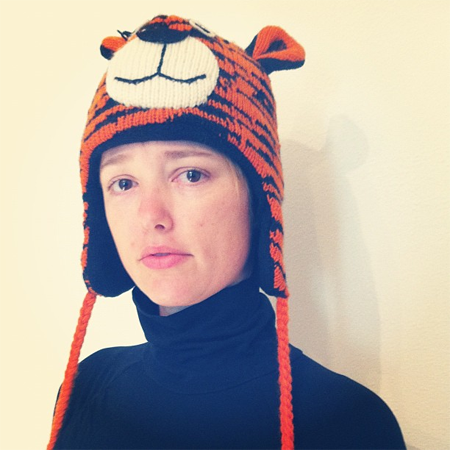
Every time I talk to Johannes about Sierra Zulu I keep thinking about all the ways to extend the film left, right, up, and down. He said that he can actually see the smoke billowing out of my head I’m thinking so fast.
If you are at all familiar with monochrom, you know that they are an extremely imaginative and experimental group and will try pretty much anything. The film has many layers – the comedic layer down to the philosophical layer and the characters are interesting and just as layered. That’s why I decided to work on this project, there is no right way to do Transmedia so working with people that will try new things and iterate are the ones that are going to figure out how to engage and reach their audience. I really believe that the Transmedia elements of this project are going to be new and fresh and totally off the hook.
What is Transmedia?
Well, it’s a lot of things, but the most important thing that it does is let you experience a story on multiple platforms, from different perspectives, and hopefully extends it beyond the main medium, in this case film. Here’s a blog post I wrote that hopefully explains it to you in simple terms.
So, how did I get myself into this? I’m one of the co-organizers for Transmedia LA and I thought that because Johannes helped me out with my project, Cat Workout, it was only fair to offer my services with his project. I’m also an expert in direct-to-consumer strategies and as this is an indie film, that’s a good skill to offer up. The most important reason of course is that the main character is Canadian and I want to be sure that the actor does the accent correctly.
BTW: I was excited to read that Ben Rock joined the project because he is in my Transmedia LA group!
This project is pretty open so if you have some fun ideas to extend and enhance this project or even want to help, please add a comment or ping me.
Tara Tiger Brown
@tara
http://tarathetiger.com
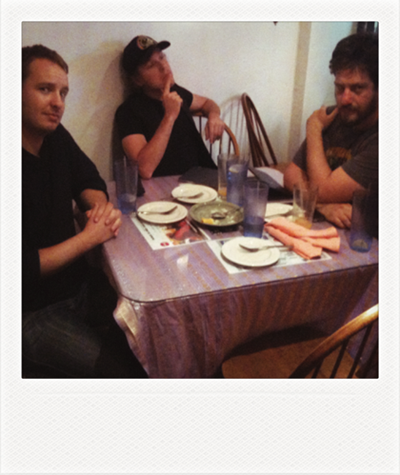 (Above: consultants, directors, sticky rice)
(Above: consultants, directors, sticky rice)
What does a movie production really need? Experts. At least a few.
Our wonderful script & production consultants Ben Rock and Tore Schmidt live and work in Los Angeles — and that’s why monochrom’s Johannes Grenzfurthner met them for a decadent Thai dinner to talk about business and perversions.
Let us introduce our friends…
Ben Rock began his career as a production designer, breaking out with the blockbuster 1999 movie The Blair Witch Project. As one of the creators of the mythology of the film (as well as creating the infamous “stickman”), Ben moved into directing in 2000 in the budding “viral marketing” industry. Following that, Rock wrote, directed, and produced the mock-documentary The BPRD Declassified to market the release of Hellboy, directed a series of award-winning shorts produced for Audi, directed 29 viral videos for USA Network’s The 4400 and 56 viral videos for HBO’s series True Blood. Rock directed his first feature, Alien Raiders, for Warner Brothers’ signature genre label Raw Feed. The film, which was shot in fifteen days with a modest budget, took the film festival world by storm, winning numerous awards and playing to packed houses across the country.
Tore Schmidt studied Film and Communication Sciences at UCLA’s School of Theater, Film and Television and Georg-August-University in Goettingen, Germany. He began his career working as a producer and production manager on narrative and documentary features in his native Germany; he then returned to Los Angeles to join Venice-based Menemsha Films as VP Acquisitions and Marketing where he was involved in the distribution of foreign art house films for the American market. Mr. Schmidt then moved to Gail Mutrux’ Pretty Pictures (Kinsey, Quiz Show, Nurse Betty) where he served as Story Editor and CE and was actively involved in the development and production of all company projects. He is currently the Head of Development at Pretty Pictures at Universal Studios.
They are currently giving us feedback on version 3.6 of our script. Let’s hope they will soon be able to help us with hands-on aspects of our production… but that’s another story.

The International Festival of Independent Games currently takes place in Culver City/Los Angeles. We are paying a visit, because Sierra Zulu will be the first feature-length film that is (at least partially) based on an indie computer game series.
monochrom launched Soviet Unterzoegersdorf: The Adventure Game in 2005 — and a sequel followed in 2009.
We wanted to combine (retro)gaming and (crypto)humor to delve into political discourse. We wanted to harvest the wonderful aesthetic and historic qualities of adventure gaming. It is a commemoration and resurrection, and one more reminder that contemporary gaming (in its radical business-driven state-of-the-artness) should not dare to forget the (un)dead media of the past — or they will haunt them.
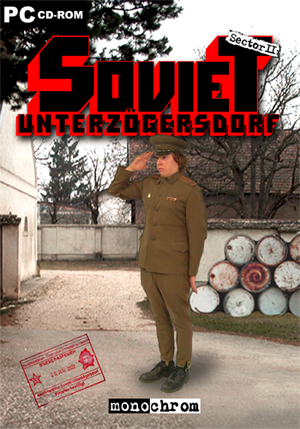 Adventure games are nearly extinct, but for many people in the Soviet Unterzoegersdorf team, adventure games are part of their media socialization. For the computer industry it is one of the most successful gaming formats of the past. And for the feminist movement it is proof that a woman — we are talking about Sierra On-Line’s Roberta Williams — was able to shape the form of a whole industry totally dominated by men.
Adventure games are nearly extinct, but for many people in the Soviet Unterzoegersdorf team, adventure games are part of their media socialization. For the computer industry it is one of the most successful gaming formats of the past. And for the feminist movement it is proof that a woman — we are talking about Sierra On-Line’s Roberta Williams — was able to shape the form of a whole industry totally dominated by men.
Computer games are embedded in the cultural framework of technological developments. In the study of technological development and creativity, focusing attention on the failure, the error, the breakdown, the malfunction means opening the black box of technology. Studies have convincingly demonstrated that the widespread inability to understand technological artifacts as fabricated entities, as social and cultural phenomena, derives from the fact that in retrospect only those technologies that prove functional for a culture and can be integrated into everyday life are “left over.” However, the perception of what is functional, successful and useful is itself the product of social and cultural — and last but not least — political and economic processes.
To quote Langdon Winner:
Is it not the point of all invention, technique, apparatus, and organization to have something and have it over with? (…) Technology, then allows us to ignore our own works. It is license to forget.
Sierra Zulu wants to continue this thread — in a different media format.